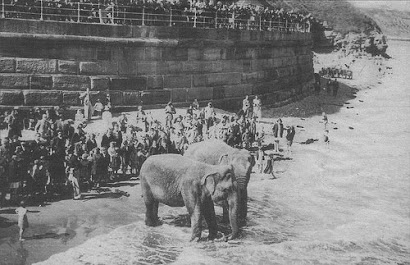 “I saw the wonder of the town in the light of the afterglow that was red in the west. The clouds blossomed into rose-gardens; there were seas of fairy green that swam about isle of crimson light; there were clouds like spears of flame, like dragons of fire. And under the mingling lights and colours of such a sky Banwick went down to the pools of it’s land locked harbour and climbed again across the bridge towards the ruined abbey and the great church on the hill”
“I saw the wonder of the town in the light of the afterglow that was red in the west. The clouds blossomed into rose-gardens; there were seas of fairy green that swam about isle of crimson light; there were clouds like spears of flame, like dragons of fire. And under the mingling lights and colours of such a sky Banwick went down to the pools of it’s land locked harbour and climbed again across the bridge towards the ruined abbey and the great church on the hill”The Happy Children
The Welsh author Arthur Machen (1863-1947) is best known as a writer of supernatural and horror fiction. A contemporary of Bram Stoker and Oscar Wilde he also influenced the likes of H. P. Lovecraft, Stephen King and Alan Moore. His most famous books include The Great God Pan (1894), The Three Impostors (1895) and The Hill Of Dreams (1907), but it was his work as a journalist for the London paper The Evening News that would lead him to visit Whitby in November 1916.
The visit was arranged ostensibly for Machen to write an article on the town’s resurgent jet industry, which had seen a revival due to the wartime fashion for wearing mourning jewellery. But what really fascinated him was the town itself, regarding it as beautiful and unspoilt, he would later compare it favourably to seeing the view of Avignon from Rhone; ‘It was wonderful, but I do not know it more wonderful than Whitby as I saw it a few days ago’. It was this enthusiasm for the place that inspired him to writing the short story ‘The Happy Children’.

Machen would also have been aware that Whitby had suffered it’s own atrocities two years earlier, when it was bombarded along with Scarborough and Hartlepool by two German destroyers, killing 137 people and injuring a further 592.
...
As was usual for Machen’s writing, the story also has a strong religious undercurrent, referring to the Biblical slaughter of babies by Herod as is celebrated in the feast of Holy Innocents. But what is more prevalent in this piece is Machen’s own personal belief system, which together with detailed and evocative descriptions of nature and the landscape, conjures up a seemingly more magical and ancient time.
.jpg)
Throughout the First World War Arthur Machen was a patriot giving his full support to the war in Europe, believing that the Allied forces were fighting a just war against the evil German Empire. He was less forthcoming with his praise when it came to the battle for hearts and minds back in England though, especially after the publication of The Bowmen and the resultant ‘Angels Of Mons’ myth.
What becomes more apparent with stories like The Happy Children is that his writing takes on a more serene quality, as if Machen himself having become increasingly distressed by the utter devastation the war was causing, wants to escape along with the war’s innocent victims into a more peaceful place.

Read The Happy Children by Arthur Machen here
Written exclusively for OUT ON YE! by RICHARD LOCKER.
Thanks to Gwilym Games and Chris Corner for all their help.



1 comment:
I have made a film of this story which is showing here:
http://www.nationalmediamuseum.org.uk/nmem/fantastic/2011/Film_Detail.asp?filmid=9758#startcontent
Best wishes,
Mark Goodall
Post a Comment